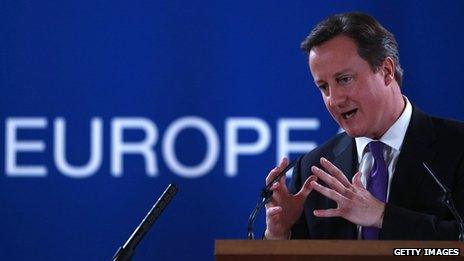Cameron touches raw nerve
- Published
- comments

BRUSSELS - The latest European Union budget summit has brought that well-worn narrative of Britain versus France back into play, but there are fascinating signs of a more emotive battle going on beneath the surface.
That sub-text was less about whether the union's next seven-year budget would end up at euro 913bn or the euro 908bn eventually agreed, a small difference rendered even less significant when one considers that it is dwarfed by what national governments spend, but concerned whether UK Prime Minister David Cameron's recent call for reform - and re-negotiating UK membership - had gained wider traction.
Ending the marathon negotiation with a personal declaration of victory to reduce the budget while protecting the UK rebate, Mr Cameron was asked whether these tense hours of debate might inform his bigger agenda about reforming the EU and Britain's place within it.
"We formed a strong alliance", he said, and it could be seen as "part of the new settlement that we seek".
There are legions of people in the European set-up who find his calls for smaller budgets, and repatriated powers anathema. Martin Schulz, president of the European parliament, allowed some of his ire about Britain's stance to burst into the open when questioned by BBC colleague Iain Watson at a press conference on Thursday night.
How could Britain opine on the next seven-year budget, asked Mr Schulz, when it might not even be a member of the EU by the end of it? For good measure he attacked George Osborne, the UK chancellor, for saying (in Mr Schulz's version of what was presumably a private conversation at the Davos economic forum) that he cared less about what the EU committed itself to spend than he did about what the UK actually had to cough up.
Casting doubt over whether the European Parliament would actually approve a trimmed budget once the national leaders signed off on it, the president implied that its members might come under such pressure to do so that they should be allowed to vote in secret.
The annoyance of Francois Hollande, president of France, at Mr Cameron's speech was also apparent to some. He cut a scheduled meeting with the British and German leaders and threatened to veto any budget that did not protect "agriculture and growth".
One person close to the negotiations told me, "he has become very emotional about it, and it may be in reaction to Mr Cameron's speech, that he sees himself defending the European status quo". Ending the summit he put a brave face on France's diplomatic reverse, calling it a, "good compromise".
It is a reasonable deduction that had the British leader's speech been greeted with ridicule or indifference across Europe, the denizens of the European apparatus would have reacted with cold disdain. But something seems to have worried them, and they will now be reading the runes of a summit that ended with an unprecedented decision to cut EU spending, trying to evaluate whether this is a one-off or a symptom of a more troubling shift in Europe's centre of gravity - a move in a more sceptic direction.
Of course it has been apparent for some time that the harsh austerity measures mandated by Germany and other northern European countries on the likes of Italy, Greece, and Spain have caused some deep resentment of the EU. It is a nervousness about what form these feelings might take that has caused Italy's Mario Monti (Mr Hollande's principal ally in trying to defend a higher EU budget) to warn about the "populist" tactics of his opponents in casting doubt about the necessity of such austerity.
However these southern critics are highly unlikely to side with Mr Cameron - except perhaps the ever mercurial Silvio Berlusconi - in arguing for a smaller Europe. The group that seems to be making people in Brussels nervous is "the parsimonious ones" as one French newspaper dubbed them yesterday.
Sweden, Denmark, and the Netherlands lined up with Britain on Thursday on the budget question, and Finland hovers on the fringes of this group. All of these countries have form in standing up against the "ever closer union": Sweden by voting in a referendum not to adopt the euro; Denmark by opting out of the Lisbon Treaty provisions on the single currency; and the Netherlands by voting against the European constitution in 2005 and more recently questioning the need to bail out the weaker eurozone members.
Germany's attitude proved critical to the question of whether this "parsimonious" group could win the day. Chancellor Angela Merkel had already shown her hand in wanting further cuts after the failure of November's summit. Although she did not side overtly with the UK, Sweden, Netherlands, and Denmark, her objection to the Franco-Italian counter-proposal doomed it.
Le Figaro, the French daily, on Friday evening reported the outcome as a, "double success for Mr Cameron". For France, it added, "this clash... hides a more worrying sub-text for the future: the proven paralysis of the Franco-German axis".
To be clear, Ms Merkel's assistance on the budgetary issue cannot be taken as a sign of support for Mr Cameron's broader platform of re-negotiation. But in the summit statements of the Dutch, and Swedes in particular he can take comfort that there is support on this wider agenda.
The Dutch parliament has scheduled a full day's debate on the implications of the British prime minister's Europe speech, something he was delighted to tell reporters at the end of the summit.